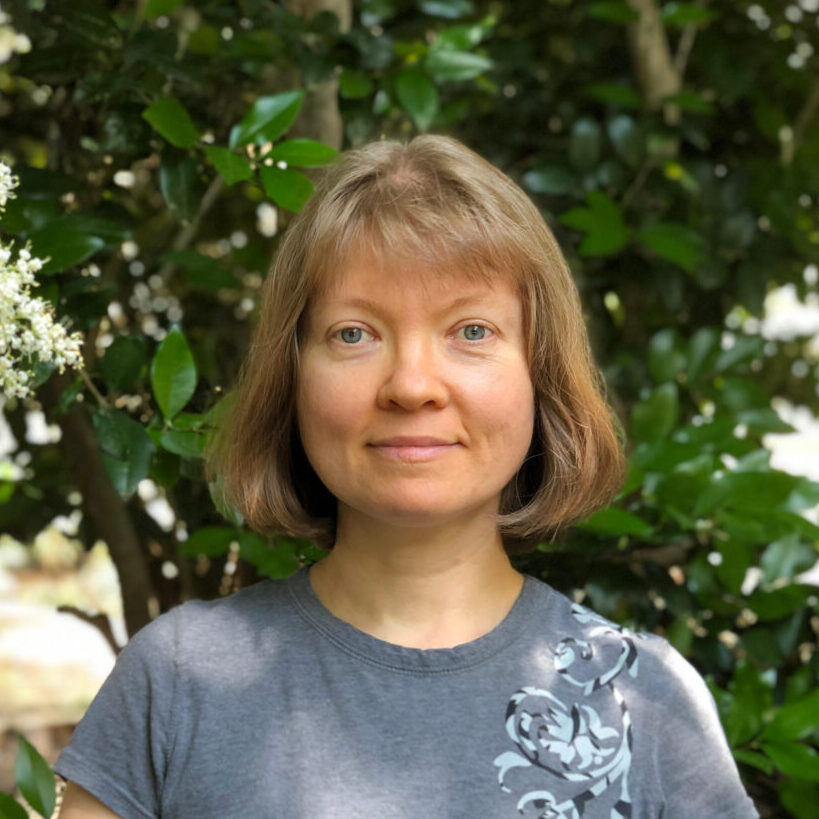GGA Faculty Spotlight: Anna Stepanova on Seeding Scientific Curiosity and the Best Summer Salad.

Whether you are in a state-of-the-art research lab or your own backyard, science starts with a question. For Anna Stepanova, associate professor of plant and microbial biology, these questions were first formed as she watched plants grow in her family’s garden. Today, Stepanova shares this spark of scientific curiosity with students through her lab’s outreach programs.
Anna Stepanova was born to a family of physicists in Nizhny Novgorod, Russia. This led her older sister to experience quite a bit of familial pressure to follow in the footsteps of their parents, aunts and uncles. However, Stepanova recalls that, as she was the youngest, her parents were a bit less strict when it came to her decision to pursue biology.
“My father was passionate about apple tree grafting,” Stepanova remembers. “Biology was something that my father enjoyed as a hobby. So he was okay with me going into biology. I guess, with the younger kid, maybe they were less strict.”
During Stepanova’s undergraduate studies in biology, she joined an exchange program called The American Council of Teachers of Russian (ACTR), which allowed her to study abroad in the United States at the University of Nevada, Reno. She decided to continue her studies in the United States at the University of Pennsylvania for her doctorate degree where she worked in the Joe Ecker Lab studying the plant hormone, ethylene.
It was here that she met her husband, Jose Alonso, who at the time was a postdoctoral researcher in the Ecker lab. After Stepanova completed her Ph.D., the couple moved to NC State where they now run the Alonso-Stepanova Laboratory, continuing to study ethylene and other plant hormones that control plant growth and development.
In addition to their research, the Alonso-Stepanova Lab has several outreach initiatives. Plants4Kids is a series of scientific experiments that kids can perform using materials from around the house, aimed at encouraging them to ask questions, helping them make observations, and guiding them through the process of designing their own experiments.
“Plants4kids came to be when I had kids of my own and I had to entertain them during summer or spring breaks,” Stepanova recalls. “To keep them busy, I would give them little assignments; we would take peas or bean seeds and watch them germinate and grow. We would play around with different types of soil, or see what would happen if you germinate them in napkins or toilet paper or junk mail that is shredded.”
Her children, who went on to study in STEM fields in university, invited their neighbors to join in and the program continued to grow from there. Today the Alonso-Stepanova Lab brings these experiments to classrooms and museums, encouraging students to ask the same questions she asked in her family’s garden.
She also credits her 6th grade biology teacher in Russia as helping to set her on her path to pursuing biology. “He was excellent. He made us really excited.” Stepanova said. “We had a group of students that would do extracurricular experiments and that’s how I got hooked on biology in general.”

In an effort to reach even more students by empowering teachers to bring hands-on lab experiences in the classroom, the Alonso-Stepanova lab launched the NSF supported Summer Synthetic Biology Workshop for High School Teachers. In this program, highschool teachers from across the state receive hands-on training in recombinant DNA technology and synthetic biology, gaining access to a library of mini-versions of standard laboratory equipment to use into their own schools.
“When my kids were entering high school, I realized that the biology that they were learning was mostly theoretical biology. They don’t get to do hands-on things much.” She explained. “The schools don’t have resources, and the teachers don’t have training. So that’s where the idea of a teacher training workshop came about.”
At this stage in Anna Stepanova’s career, her day-to-day involves less hands-on bench work than she once imagined. However, she continues to run her own experiments in her garden, where, among many other crops, she grows more than 100 varieties of tomatoes alone.

“The best thing is eating them fresh in various types of tomato salad,” She laughs. “This is very Russian, but one of my favorite summer salads is tomato, salt, and sour cream.”
This year, Stepanova is excited to be growing the first publicly accessible genetically modified variety, the Purple Tomato developed by Cathie Martin. This transgenic tomato gets this purple hue from snapdragon DNA and is designed to be high in antioxidants as well as delicious!
- Categories: